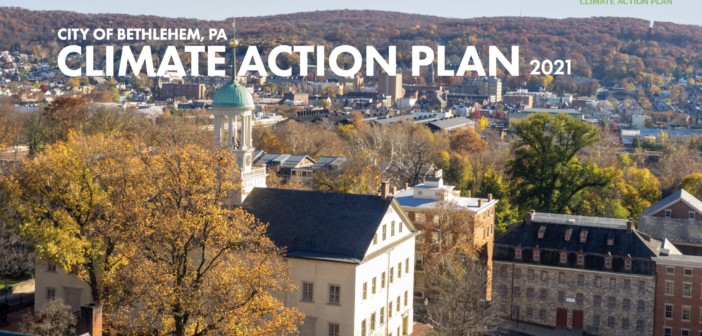Earlier this month, Bethlehem officially released its Climate Action Plan (CAP) to the public. Mayor Robert Donchez and Councilman J. William Reynolds led the virtual release. It is the first of a series of events that will occur over the next year, covering different sections of the CAP in greater detail.
The CAP is Bethlehem’s comprehensive roadmap for addressing the local effects of climate change.
“As we look to the future, a rapidly changing climate requires establishing a new vision for Bethlehem as an equitable, prosperous, resilient, healthy and inclusive city that takes actions to mitigate climate change,” Donchez said.
Over the past year, Bethlehem has worked closely with community members, businesses, and other stakeholder groups alongside consultant WSP, a global engineering firm, and Nature Nurture Center (NNC), a science-based community center, to develop this plan.
“The CAP’s purpose is to reduce our contribution to global climate change, promote equity and climate justice, and to prepare the city for climate change,” Reynolds said.
During the presentation, Reynolds reviewed the history of the CAP and the planning process before discussing the main objectives of the plan.
Early in the process, the team created the Bethlehem Climate Action Plan Working Group , which included representatives from city government, citizen groups, universities (including faculty from Lehigh) and non-profit organizations to help set the direction of the plan.
The CAP development team held virtual public meetings to gather input from the community and understand what was most important to Bethlehem citizens.
Much of the feedback received indicated a strong preference for prioritizing environmental justice and equity.
“There was a lot of support in our community for this idea. It was one of the things that were non-negotiable with many people who were coming to our meetings,” Reynolds said.
One way the city is prioritizing environmental justice and equity is by ensuring that 40 percent of overall benefits resulting from city spending on the CAP go to the local community.
“The citizens that are going to be the most affected by climate change and face the most severe impacts are also our most vulnerable citizens so it’s not something that we should do or can do, it’s something that we need to do,” Reynolds said. “It is our responsibility that we are making a Bethlehem that will work for everybody.”
Reynolds outlined the next steps of implementing the CAP and said phase I of the plan will be rolled out over the course of this year and next.
The first step in phase I is establishing a framework and creating institutional accountability to ensure the CAP is implemented and working groups are structured.
Reynolds said another priority of his is establishing an office of sustainability in city hall.
“It makes sense to have a director of sustainability to be the one that is leading these efforts within city hall rather than putting something else on other people’s plates that are already busy,” Reynolds said.
Other steps include improving data to track process, building public support for the CAP, and achieving “no-regrets” quick wins.
Reynolds said the city is discussing how it will structure the series of events in 2021 to outline the main priorities of the CAP and keep the momentum of public input.
Gab Kesh, ‘24, had not initially heard about the Bethlehem CAP, but thought it was important for Lehigh students to know about.
“Lehigh students interact with the Bethlehem community in many more ways than they realize and can have a significant impact on the Bethlehem community if we all take responsibility to protect it,” Kesh said.
Kesh said her hometown has tried doing small things to be more environmentally friendly, but “nothing this large-scale.”
“This is an exciting day,” Reynolds said. “You don’t look around and see a lot of other mid-size cities that have a plan that is this ambitious, this aggressive, and be taken this seriously.”






Comment policy
Comments posted to The Brown and White website are reviewed by a moderator before being approved. Incendiary speech or harassing language, including comments targeted at individuals, may be deemed unacceptable and not published. Spam and other soliciting will also be declined.
The Brown and White also reserves the right to not publish entirely anonymous comments.